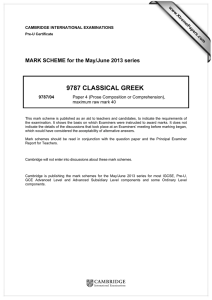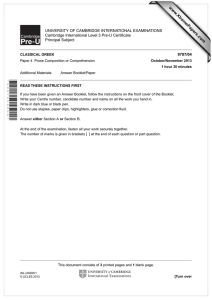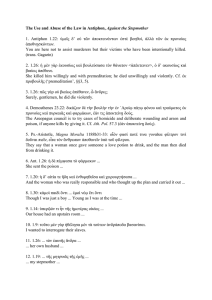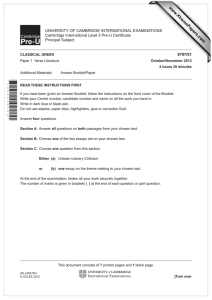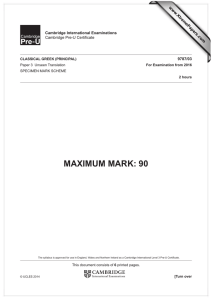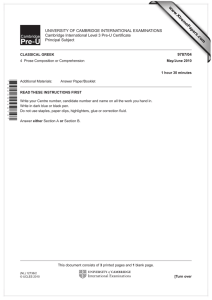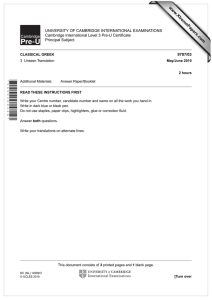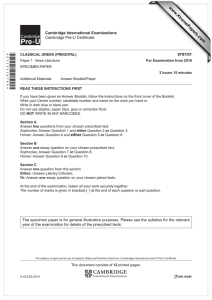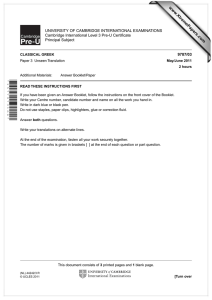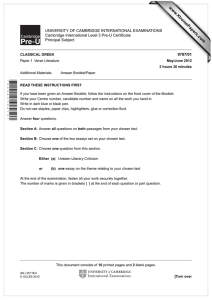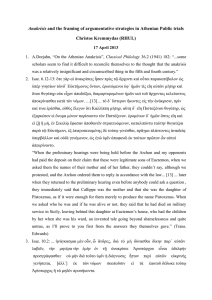www.XtremePapers.com
advertisement
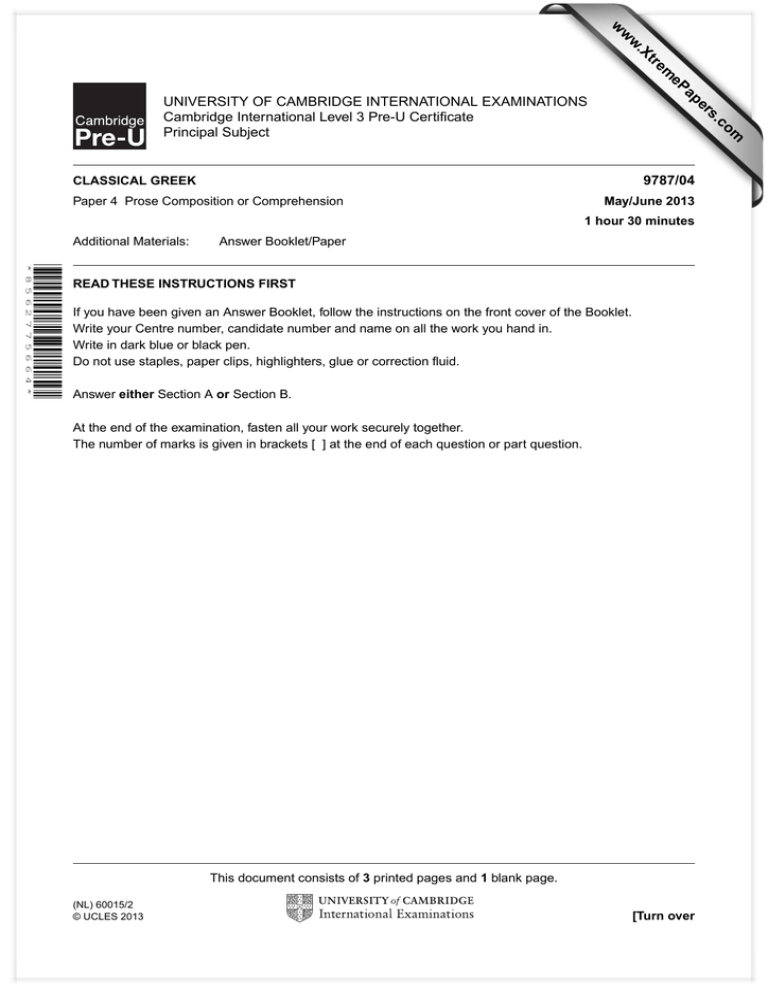
w w ap eP m e tr .X w om .c s er UNIVERSITY OF CAMBRIDGE INTERNATIONAL EXAMINATIONS Cambridge International Level 3 Pre-U Certificate Principal Subject 9787/04 CLASSICAL GREEK Paper 4 Prose Composition or Comprehension May/June 2013 1 hour 30 minutes Additional Materials: Answer Booklet/Paper *8562775664* READ THESE INSTRUCTIONS FIRST If you have been given an Answer Booklet, follow the instructions on the front cover of the Booklet. Write your Centre number, candidate number and name on all the work you hand in. Write in dark blue or black pen. Do not use staples, paper clips, highlighters, glue or correction fluid. Answer either Section A or Section B. At the end of the examination, fasten all your work securely together. The number of marks is given in brackets [ ] at the end of each question or part question. This document consists of 3 printed pages and 1 blank page. (NL) 60015/2 © UCLES 2013 [Turn over 2 Either Section A On alternate lines translate the following passage into Greek: The Plataeans and the Thebans try to make a deal. The Plataeans sent a messenger to the Thebans outside the walls to ask them not to harm Plataean property if they valued the lives of their own men who were at that time prisoners inside the city. According to what the Thebans said later, the Plataeans promised to hand back the prisoners when the enemy left Plataean territory. But afterwards the Plataeans denied this, claiming that they had promised merely to return them if a truce was agreed. So it is not clear which of the two sides was telling the truth. At any rate, as soon as the Plataeans had carried all their property into the city, they executed the prisoners. It seems therefore that they did act in bad faith, perhaps because of the bitter hatred that had existed between the two states for some time. [Total: 40] Plataeans Thebans οἱ Πλαταιῆς, -έων οἱ Θηβαῖοι, -ων Or Section B Read the following passage and answer the questions which follow: The Spartans accuse the famous Athenian general, Themistocles, of collaboration with the Persians. τοῦ δὲ µηδισµοῦ1 τοῦ Παυσανίου οἱ Λακεδαιµόνιοι πρέσβεις πέµψαντες παρὰ τοὺς Ἀθηναίους ξυνεπῃτιῶντο καὶ τὸν Θεµιστοκλέα, ὡς ηὕρισκον ἐκ τῶν περὶ Παυσανίαν ἐλέγχων2, ἠξίουν τε τοῖς αὐτοῖς κολάζεσθαι αὐτόν. οἱ δὲ πεισθέντες (ἔτυχε γὰρ ὠστρακισµένος καὶ ἔχων δίαιταν µὲν ἐν Ἄργει, ἐπιφοιτῶν3 δὲ καὶ ἐς τὴν ἄλλην Πελοπόννησον) πέµπουσι µετὰ τῶν Λακεδαιµονίων ἄνδρας οἷς εἴρητο ἄγειν ὅπου ἂν περιτύχωσιν. ὁ δὲ Θεµιστοκλῆς προαισθόµενος φεύγει ἐκ Πελοποννήσου ἐς Κέρκυραν, ὢν αὐτῶν εὐεργέτης. δεδιέναι4 δὲ φασκόντων Κερκυραίων ἔχειν αὐτὸν ὥστε Λακεδαιµονίοις καὶ Ἀθηναίοις ἀπεχθέσθαι, διακοµίζεται ὑπ’ αὐτῶν ἐς τὴν ἤπειρον τὴν καταντικρύ5. καὶ διωκόµενος ὑπὸ τῶν προστεταγµένων κατὰ πύστιν6 ᾗ χωροίη, ἀναγκάζεται παρὰ Ἄδµητον τὸν Μολοσσῶν βασιλέα ὄντα αὐτῷ οὐ φίλον καταλῦσαι7. καὶ ὁ µὲν οὐκ ἔτυχεν ἐπιδηµῶν, ὁ δὲ τῆς γυναικὸς ἱκέτης γενόµενος διδάσκεται ὑπ’ αὐτῆς τὸν παῖδα σφῶν λαβὼν καθέζεσθαι ἐπὶ τὴν ἑστίαν. καὶ ἐλθόντος οὐ πολὺ ὕστερον τοῦ Ἀδµήτου δηλοῖ τε ὅς ἐστι καὶ οὐκ ἀξιοῖ, εἴ τι ἄρα αὐτὸς ἀντεῖπεν8 αὐτῷ Ἀθηναίων δεοµένῳ, φεύγοντα τιµωρεῖσθαι. 1 5 10 15 Thucydides 1.135–6 (with omissions) © UCLES 2013 9787/04/M/J/13 3 1ὁ µηδισµός, -οῦ ἔλεγχος, -ου 3ἐπιφοιτάω 4δείδω 5καταντικρύ 6ἡ πύστις, -εως 7καταλύω 8ἀντιλέγω 2ὁ collaboration with Persia investigation I travel about I fear (the perfect δέδια is usual with present meaning) opposite understanding I go to stay with I oppose (i) Lines 2–3 (ὡς ηὕρισκον . . . κολάζεσθαι αὐτόν): on what basis did the Spartans accuse Themistocles, and what did they suggest that the Athenians do to him? [3] (ii) Lines 3–5 (οἱ δὲ . . . Πελοπόννησον): what was the Athenians’ initial reaction? Why could they not act immediately? [1,2] (iii) Lines 5–6 (πέµπουσι . . . περιτύχωσιν): how did the Athenians arrange to capture Themistocles? [5] (iv) Lines 6–7 (ὁ δὲ . . . εὐεργέτης): to where did Themistocles flee, and why? [2] (v) Lines 7–9 (δεδιέναι . . . καταντικρύ): what did Themistocles’ new hosts say on his arrival? What did they then do? [4] (vi) Lines 10–11 (ἀναγκάζεται . . . καταλῦσαι): what was Themistocles forced to do, and why was this a problem? [2] (vii) Lines 12–13 (ὁ δὲ τῆς . . . τὴν ἑστίαν): what was Themistocles instructed to do, and by whom? [3] (viii) Lines 14–15 (δηλοῖ τε . . . τιµωρεῖσθαι): what does Themistocles say to his new host? [4] (ix) (x) (xi) (xii) Identify the following: a) a contracted verb; b) an aorist passive participle; c) a genitive absolute; d) a participle used causally. [4] Identify and explain the mood of the following verbs: a) περιτύχωσιν (line 6); b) ἔχειν (line 8); c) ἀπεχθέσθαι (line 8). [6] Explain the cases of the following: a) µηδισµοῦ (line 1); b) ὄντα (line 11). [2] Identify the tense of each of the following verbs: a) ἠξίουν (line 3); b) ὠστρακισµένος (line 4). [2] [Total: 40] © UCLES 2013 9787/04/M/J/13 4 BLANK PAGE Permission to reproduce items where third-party owned material protected by copyright is included has been sought and cleared where possible. Every reasonable effort has been made by the publisher (UCLES) to trace copyright holders, but if any items requiring clearance have unwittingly been included, the publisher will be pleased to make amends at the earliest possible opportunity. University of Cambridge International Examinations is part of the Cambridge Assessment Group. Cambridge Assessment is the brand name of University of Cambridge Local Examinations Syndicate (UCLES), which is itself a department of the University of Cambridge. © UCLES 2013 9787/04/M/J/13
